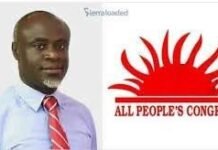By Amin Kef (Ranger)
It is being mooted within business circles across the country that, the Finance Act 2023, represents a short-sighted approach to addressing revenue shortfalls and may harm economic growth and development in Sierra Leone.
Financial and economic experts are of the view that while it is good to recognize the Government’s need for revenue to fund essential services, relying on overtaxing a small group of taxpayers is not a viable long-term solution.
The new tax and regulatory changes will have a significant impact on the Aviation and Tourism industry no doubt, but with higher taxes and charges on air tickets and operations in the new terminal, this could potentially discourage tourism growth and drive more people to using the boat service to Sierra Leone via Guinea.
It is important to note that, the revised GST Act Exempt Supplies list reduces the scope of GST exemptions, increasing the tax burden for businesses operating in certain sectors, including air transportation and financial services. In effect, this could lead to a further decline in the scope of such businesses making any profit to manage operating costs.
The amendment to Section 8 of the Goods and Services Tax Act, 2009 to include digital marketplaces and services is likely to result in increased tax revenue collection from online businesses operating in Sierra Leone. However, the only snag is that how many people or businesses will migrate to the digital marketplaces and services.
The introduction of a new 2% Tourism Levy on accommodation, food, drinks, and related services offered by tourism establishments, coupled with the Annual Circulation Permit Levy of SLE 200 imposed on all vehicles (including boats and airplanes) except motorbikes and bicycles, is also likely to impact businesses negatively.
The new Minimum Alternate Tax (MAT) of 3% of turnover increases the tax burden on businesses in Sierra Leone and may hamper their growth potential, lead to job losses, reduction in expenses and investment, and see an increase in prices as companies look to increase their margins to find the 3% burden.
We understand that these measures were taken at the behest of the Bretton Woods institutions. Nonetheless, we believe that a more comprehensive approach is necessary, one that involves expanding the tax base, reducing Government spending and promoting economic growth.
Business owners are therefore urging the Government of Sierra Leone to consult more with the business community and explore alternative solutions that ensure fairness and equity in the tax system and foster a healthy and sustainable economy.
It is against this background that we at The Calabash are adding our voice to the fact that there is no economy in the world which grows when the business community of that country is facing an unfair and disadvantageous tax system.
We too want to believe that maybe, it is time for the Government to do a rethink!




